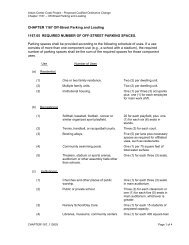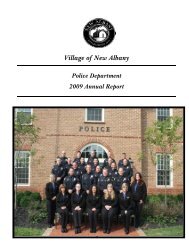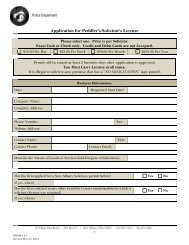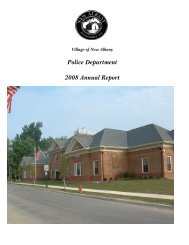NEW ALBANY POLICE DEPARTMENT - New Albany, Ohio
NEW ALBANY POLICE DEPARTMENT - New Albany, Ohio
NEW ALBANY POLICE DEPARTMENT - New Albany, Ohio
You also want an ePaper? Increase the reach of your titles
YUMPU automatically turns print PDFs into web optimized ePapers that Google loves.
<strong>NEW</strong> <strong>ALBANY</strong> <strong>POLICE</strong> <strong>DEPARTMENT</strong><br />
7.1 - Special Duty Employment<br />
7.1.1 Defined<br />
Special duty employment is defined as secondary employment performed in return for wages<br />
wherein the employment is directly related to the authority granted to the individual as a result of<br />
his/her sworn law enforcement status as a <strong>New</strong> <strong>Albany</strong> Police Department officer. Examples of<br />
common special duty employment assignments are directing traffic at road construction, providing<br />
security at public gatherings, and providing security to private property located within <strong>New</strong> <strong>Albany</strong>.<br />
Sworn police officers are permitted to engage in special duty employment upon written<br />
authorization (PD-00-221)(see Addendum A) of the Chief of Police. Each year in January, an<br />
employee is required to update his/her special duty employment authorization/information.<br />
Authorization will usually not be granted until an officer has completed his/her FTO training period.<br />
This authorization may be withdrawn by the Chief of Police for cause. If a request to work special<br />
duty employment is denied or withdrawn, the Chief of Police will provide the reason(s) to the<br />
affected officer(s) in writing.<br />
Special duty employment that interferes or conflicts with an officer’s employment by the City will<br />
not be permitted. When ordered to report for duty, an officer will do so without regard to special<br />
duty employment. For the purposes of this directive, a written or verbal order from a supervisor or<br />
a court subpoena is considered an order to report for duty.<br />
7.1.2 General Rules<br />
Officers engaged in special duty employment are subject to all <strong>New</strong> <strong>Albany</strong> Police Department<br />
and City of <strong>New</strong> <strong>Albany</strong> rules, policies, directives, and orders. Special duty employment must be<br />
within <strong>New</strong> <strong>Albany</strong>’s corporation limits unless prior written permission is obtained from the Chief of<br />
Police. The below listed rules apply to officers working special duty employment:<br />
<br />
<br />
<br />
<br />
<br />
<br />
Officers are not permitted to solicit special duty employment for the <strong>New</strong> <strong>Albany</strong> Police<br />
Department. Employees may suggest this option to citizens or organizations who inquire<br />
about hiring off-duty officers to work specific events within <strong>New</strong> <strong>Albany</strong>.<br />
Police employees are prohibited from receiving compensation, fees, commissions, kickbacks,<br />
or other monetary consideration for providing, coordinating, locating, or procuring special duty<br />
work for the Police Department or other personnel.<br />
Police officers will not conduct stake-outs while working special duty without prior approval<br />
from the Chief of Police. Officers are not to perform special duty employment for any<br />
organization currently involved in a labor dispute or strike situation.<br />
An officer will not provide any information obtained from the Law Enforcement Automated<br />
Data System (LEADS) to a special duty employer. Further, officers will not share confidential<br />
information from Departmental case files, records, or reports with a special duty employer.<br />
While an officer may work a special duty job at a liquor establishment or where liquor is being<br />
legally sold, officers should limit their detail primarily to parking lots and outside areas.<br />
Officers are not permitted to perform the duties of “bouncers” or ID checkers.<br />
If two or more officers are working a special duty assignment, the senior officer will assume a<br />
“supervisory” role unless a supervisor is working the job. In such cases, rank shall determine<br />
supervisory status. Full-time officers shall have supervisory status over reserve officers, no<br />
matter the seniority.<br />
2















